|
Posted by kodomo on
06-20-2015
|
|
fiogf49gjkf0d
-
Disclaimer: I love listening to experienced people. However I do not do everything they say. I would like to hear them as it can direct me and save me some resources like time and money and make me think of things I have missed and need to experiment on. I am all for experimenting.
-
I am in the process of building a new system. I already have a horn loaded system and I have been trying to correct what I have been hearing and identifying as wrong. It came to a point that now I am completely changing them. The system I started was a klipschorn. I changed the woofers, the drivers, the crossovers, the midrange horn. I tried aligning the midrange and the tweeters. I changed the midrange again. I started building midrange horns etc. I do not want to go into detail and waste your time. Here is what I am trying to build now.
-
There will be most probably 5 channels but may extend to 6. I ordered the tractrix and the JMLC from Autotech, Poland.
-
-
Treble channel
- 9600hz - 45000hz - Fostex t500amkII (I have it and I am happy with it, I will keep using it in this system as well)
-
Upper Midbass
- 2400hz - 9600hz - cf 1000hz JMLC profile round horn with 1" mouth - Radian 475 be-pb compression driver
-
Lower Midbass
- 600hz - 2400hz - cf 200hz Tractrix profile round horn with 2" mouth - Radian 850 pb compression driver
-
Upper Bass
- 160hz - 600hz - cf 110hz Tractrix profile round horn with 6.85" mouth - Supravox 285-2000 paper cone alnico driver. There I did 2:1 throat compression (see details in the sketch in the next message)
-
Bass channe
l - Still looking for different solutions.
-
-
*Sixth and optional channel:
-
Sub bass channel
- 20hz - 60hz - Tapped horn - I built this tapped horn out of 22mm mdf. It is 2.44metres tall with a single fold. I put Eminence 3015lf in it. I am not sure if I will use this channel. I may use it up to 60hz if my solutions for bass channel does not satisfy me down to around at least f3 35hz.
-
-
I just did a similar structure to cessaro as with this it would be very easy for me to build and adjust channels forwards and backwards. Just the upperbass is fixed. (see sketch drawing below this post)
-
-
I have not yet figured out the crossover. I am hoping to make a good, passive network for >160hz and drive the bass (and sub bass if here is one) with hypex class d. I am not looking for an analog or digital active or dsp solution. I do not want to go for multi amps setup with an active crossover, if I did, I would go for the multi dSet solution here on this website.
-
-
I really find my amplifier good and will try and drive all my channels from 160hz and up from that. It is a 845 based amplifier. The 845 is driven by 300b's and WE 310a's. It is not a common amp and as it is made in China, most people dismiss it. It is a Line Magentic 219ia. I like listening and deciding on equipment as much as possible (although it takes years and years to learn what to listen to). This was the amp for me upon listening. It does not exaggerate, it does not sugar coat, it plays naturally but does not sound cold or flat (hate using these words for sound, but these have become somewhat common for talking about the treats of sound). I think it will have even more headroom and play better when the load below 160hz is off of it. For <160hz I plan on using hypex class d amplifiers. I have 175watt ones. I can get 400watts per bass channel (depending on my solution, I can look for other amplifiers too) I have read about the dSet solution on this website and found it logical and fitting. It may be a future project for me.
-
-
ps. I love cats and why I love the name of the site. I have two in the house and 22 more silly ones that I named, love, feed, take to the vet regularly (actually the vet comes to us). The 22 have their own room with places to sleep and play at the entrance of my house. Have 5 dogs we got from street and off from some mean people's hands too. I have no wife, and a good job as well.
-
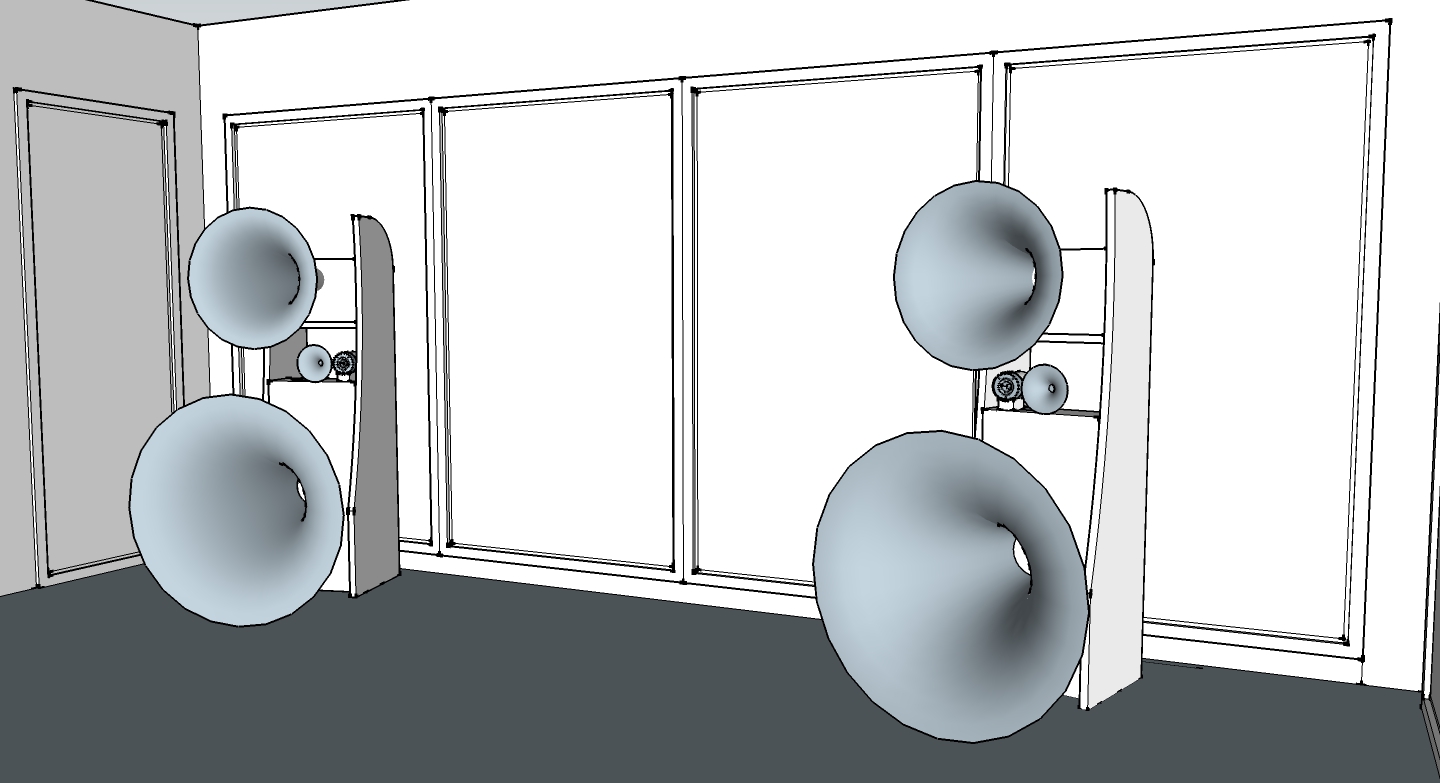
|
|
|
|
Posted by kodomo on
06-20-2015
|
|
fiogf49gjkf0d Here is the detail for throat of 110cf tractrix
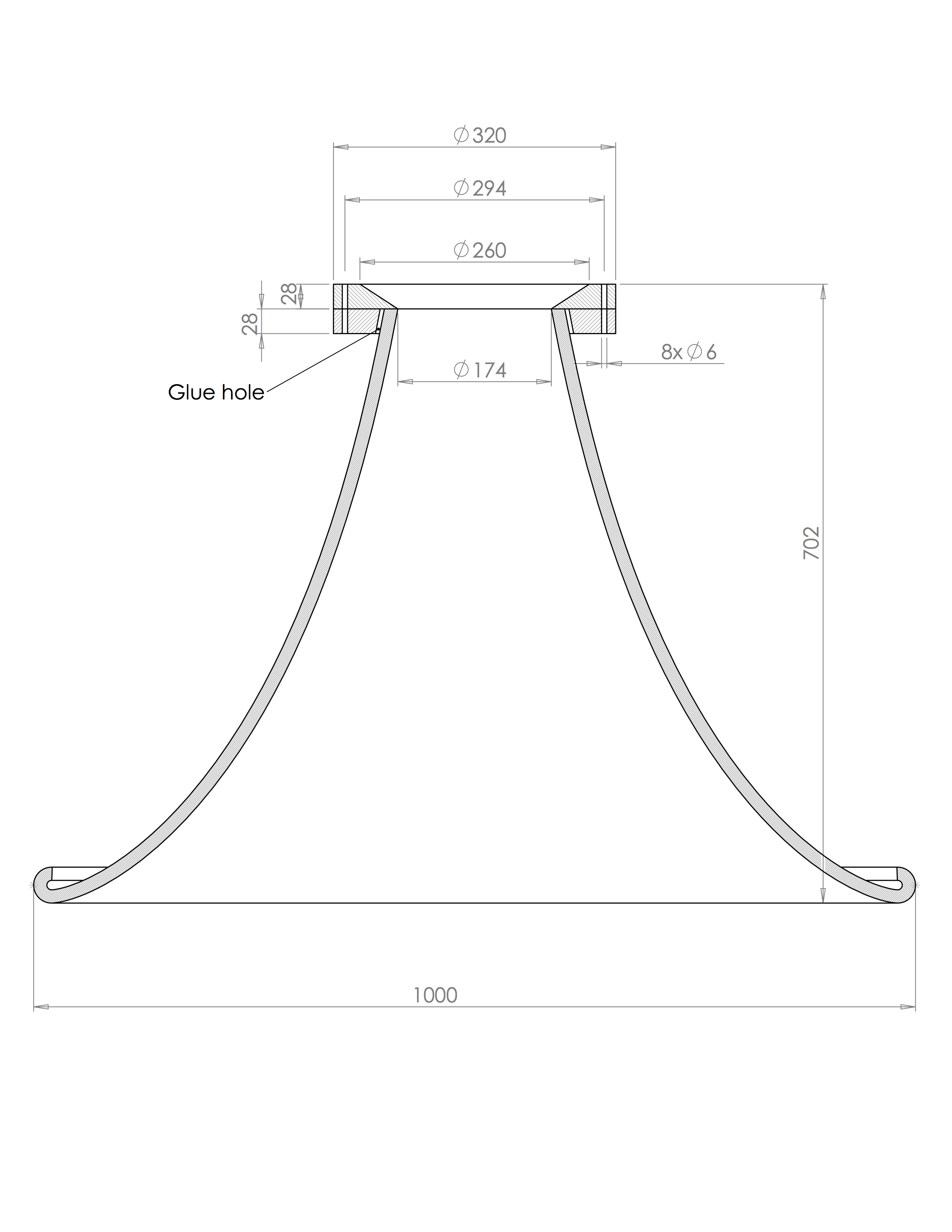
|
|
|
|
Posted by Romy the Cat on
06-20-2015
|
|
fiogf49gjkf0d Well, it sound what you like to do, which is fine
and I am sure that it will produce some kind of sound. It is hard to say if it
will be the sound you want as I do not know what you want. I presume you do. I am not sure what was the purpose of posting
you plans: do you want to solicit some critiques or just share information
about our projects? Also, what was your rational to identify the channals with precision
to 100Hz before you ever built the crossovers and heard the result?
|
|
|
|
Posted by kodomo on
06-21-2015
|
|
fiogf49gjkf0d I except suggestions and critique. I live in Turkey and I am not living in a city, I live at the coast. It is not possible for me to go and experience most of the stuff first hand. There is no one really interested in horns or have multi-way horn systems that live close by. I travel to concerts and listening sessions. Those crossover points are starting points for me. They are not set in stone. I will measure each driver in its relevant horn but I had to start somewhere. I knew I wanted horns. I knew I did not want to push my horns to their lower and upper limits. That was a deciding factor for having five (or six) channels. I knew the biggest upper bass horn I could have in my room and one that won't need a time delay. These meant I would have 4 channels from 160hz. I had some drivers and I heard some drivers. Out of the ones I heard and liked, or have been suggested by people with opinions worth listening to, I started simulating these drivers in various horns. I also read what type of horns are more suited more so than other for certain frequencies. I then though about putting these horns together, and what height it would be and how far I need to sit. These kind of dictated what I could have in my room. I can not think my speaker system without my room, they will have to work together. For example, I simulated the supravox in a cf110 tractrix and I really liked what I saw. I heard the sound of this woofer as well. I decided this is a combination worth trying. So I ordered to try. This was my approach.
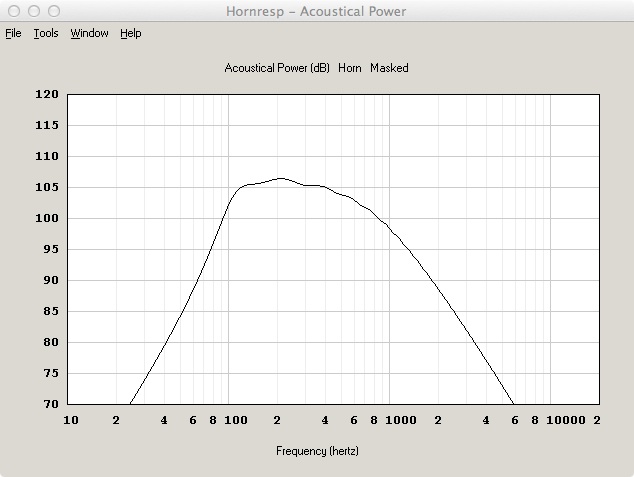
This is why I did not have designed crossovers beforehand. I also have minidsp to test crossover points and slopes before committing to building the passive components. I have built a few differenet horns to hear how they guide the sound. I built various speakers just to learn about slopes, drivers, minidsp etc. So I am open to suggestions and critique. I have been reading your site and your approach to bass. I have friends in Denmark so I can get Scanspeak drivers. I saw Scanspeak 30w/4558t00 and if I build a similar cabinet to yours with just 47litre sealed compartments, it seems they can play down to 38hz. I can have 6 sealed compartments in each cabinet for reaching necessary efficiency. Keep their amplifiers in the cabinet behind the upper bass horn that has 3 different compartments which are for crossovers, back chamber and bass amps.Romy, May I ask you why have you decided to play your upper bass horn lower than its ideal limits. Doesn't group delay rise and phasing occur. Is it not possible to play the bass arrays up to a higher freq. I know any solution is in some way another problem. What kind of problems made you cross your upper bass horns that low. Although I miss out on concerts and audio enthusiasts of the city I am not so sorry. I am a musician and live with another musician friend of mine. We have a studio and have a lot visitors at our house. Yesterday we had a Brazilian girl flutist and singer and a Mexican guitar player. I recorded them too. It is nice to be able to record people in the space we listen to music. They liked the sound of the listening/main room more so, so I set up there. When I was studying at the university, my department (interior architecture) and music department was close. So we have a lot of classically trained musicians who come to listen to and play music
|
|
|
|
Posted by Jorge on
06-21-2015
|
|
fiogf49gjkf0d Get your Upper bass horn sounding properly first, this should be a lot of fun,
Play it by itself untill you get the perfect sound out of it
adjusting the back chamber volumen changes the sound a lot.
Why use a different driver form 2400hz? Dou you have aproblem with the 850 driver?
or why not bring the 475 lower? 2400hz is a terrible spot for a xover imho
|
|
|
|
Posted by kodomo on
06-22-2015
|
|
fiogf49gjkf0d
Yes, proper upperbass is what I am l longing for. In my current system, folded horn going up to 350hz is not satisfying me and was the starting point of this project. It colors and kind of covers up the sound of big bands and orchestras in the lower registers and is really sounding different/poorer that my tractrix midrange.
I used a different driver, as I think for higher frequencies, 1" is more appropriate than 2". Also 475be-pb has a better response than 850pb in higher registers. I choose the 475's beryllium version for the same reason The two drivers constructions are very similar, and company matches them in some of their pro sound installations. I will need to wait and hear how well
(or not!)
they work together.
Why is 2400hz is a terrible point and with what slope in crossover? Is it because of hearing sensitivity of that region? For which drivers and horns have you tried this and had this result? Still, I would like to hear about your experiences and the reasons why you think it is a terrible point to cross.
|
|
|
|
Posted by Romy the Cat on
06-22-2015
|
|
fiogf49gjkf0d OK, sounds reasonable. There are plenty concerns that I would
rise with the speaker idea you proposed. However, lately begin to feel that
many of the things I have stated or might state in audio do not find proper
ears to be herd. It is not that what I propose is something overly advanced.
The problem is that in most of the
instances people not able understand what I say as to do it requires to have a
personal creative audio experience projected to more or less elevated demands
level of listening. Very few people in audio have it.
I know I sound like an arrogant jerk but in reality I am
not, I just cutting the corners of audio learning reality. For instance, I
might say that in your design the horizontal positioning of tweeter and upper
MF channel is not desirable, not to say prohibitive. You might build it as is
and then insist that it “sounds fine”. I only assure you that there is no
Mexican guitar players or classically trained musicians who come to
listen would identify that anything was wrong with MF/HF integration. One
day, perhaps tomorrow or perhaps in 15 years you will “get it”. Then you do you
might understand what I feel: it is impossible to teach people – they need
to discover the things themselves, ironically only then they begin to listen
others… but in a very different way… In my few any other way of “audio education”
besides self-realization does nothing else but breeding a number of internet
talking heads. Over the years of running this site I am guilty for creation of
number of audio zombies why fill audio sites with own presence and who are completely
clueless what they are talking as they just jongleur the audio words with no understanding
of the words meaning. The point of all of it is that without own progress,
development and own pursuit everything that you will “learn” is not applicable
or misunderstood.
Well, my wife blames me that that I have a tendency to
become overly existential at 3AM. What she does not get that she this is one of
the many my qualities that she loves about me and I suggest her to enjoy it
while it last. Now is not 3AM but 7AM, the wife sleeps, the baby is swinging in
listening room trying to fall asleep, there is a huge rain outside and
let talk a bit about horns a little.
For sure the vertical configuration for all drivers a must
in my books, read the Macondo’s Axiom. Also, for interior architecture you
might produce a better frame design. You might also to reconsider the vertical wall
on which the MF channel sits – any flat surfaces like this will be read by
horns. Your selection of horns, driver and crossover is a bit too early to discuss
as at the planning level you do not know how it will work all together.
What I would do if I were at your place is to what I always recommend:
get rid anything but upper bass and MF and make them to work together in your room.
This selection of drivers, crossover and positioning of the room might take a
few month, do not be in hurry. You should be able to get a perfectly satisfactory
sound just from those two channels. It is very important at this point to identify
what kind sound you would like to have. By fine tuning the “size” of your upper
bass presentation and expressiveness/articulation of your MF you should be able
to do a LOT. It should be your own well recognizable sound and it has to be ”interesting”
sound. I would not go for any other channels unit you get your own “perfection”
of MF and upper bass. It will take some time to listen and think about nature
of sound.
The benefit of this approach is that you are not invested into
frame, other horns, drivers and you do not have anything. They say that to make
a great sculpture you have to take a piece of marble and cut off anything not necessary.
It works very different in my view with playback. With playback you need to act
opposite then with sculpture, you need to identify and implement a singular point
of greatness that you appreciate in your MF/Upperbass tandem, and then while complimenting
the playback with more channels you need not to conflict with your singular point
of greatness but rather embrace and cultivate it.
BTW, the MF/Upperbass tandem is great playground for amplification…
The Cat
|
|
|
|
Posted by kodomo on
06-22-2015
|
|
fiogf49gjkf0d In my first design, I kept them all in a vertical line. It had one channel less back then. When I added the 1" throat JMLC 1000, I decided, as the tweeter operates over 9.6k, the slight misalignment may not matter. Still, I kept vary and kept the frame tall, so if need to, I can put all the channels on a vertical line including the tweeter and the JMLC. I really am eager to experiment on both positions and try to learn to hear the differences.
I think getting the fundamental (in my case 2" tractrix 200 and Radian 850pb) and the upperbass (110 tractrix with supravox) right to start sounds like a good approach. Even the earlier post suggesting getting the upperbass alone right by itself is something I want to do. If I can get them to integrate well with each other and the room sounding fundamentally right, it would be a great step towards the right direction. It may be very beamy but it will not be a quality I would be looking for in a 2 way horn.
I got two Scanspeak 30w/4558T00 12" woofers (fs:17hz) today from a guy over internet. I will get two more and try a 4 channel bass array with sealed compartments. It seems 4 of them with proper amplification will perform without much stress up to my proposed systems levels. They will just need more power from their amps in relation to the rest.
I think I can understand you on a few points of getting it. My friends and some of them musicians and even an acoustics PHD friend thinks my system sounds very accurate and one of the best sounding system they have ever heard. This does not mean my system has these qualities. It means this is their evaluation based upon their experience. Until I got my system better and better, I thought it was sounding fine in a lot of ways. Listening to people play live around me a lot (nearly everyday) is a great chance for me. Recording people and listening to them in the same space is another. It also shows a lot about what is wrong with a lot of recordings.
I really don't mind if you come as or actually are a jerk, especially over the internet. I am more into content, I do not get hurt easily by what people say over forums. Lots of jerks can have good ideas, it would be stupid to miss out on them because of that 
|
|
|
|
Posted by Romy the Cat on
06-22-2015
|
|
fiogf49gjkf0d  kodomo wrote: kodomo wrote: | | In my first design, I kept them all in a vertical line.
It had one channel less back then. When I added the 1" throat JMLC 1000, I
decided, as the tweeter operates over 9.6k, the slight misalignment may not
matter. Still, I kept vary and kept the frame tall, so if need to, I can put
all the channels on a vertical line including the tweeter and the JMLC. I
really am eager to experiment on both positions and try to learn to hear the
differences. |
|
And sure, you will do the experiments.
I still would advise you do not worry about neither tweeter nor alignment it
with MF and do juts MF and upper bass. If your tweeter operates over 9.6k hen
it is juts icing on the cake. Also, trust me, if you get accustom to listen a properly
implemented acoustic system that does not go over 10K then it will be a magnificent
experience for you to discover how in reality HF shall sound. So, many people
out there use too powerful tweeters juts because then have impotent MF….
 kodomo wrote: kodomo wrote: | | I think getting the fundamental (in my case 2"
tractrix 200 and Radian 850pb) and the upperbass (110 tractrix with supravox)
right to start sounds like a good approach. Even the earlier post suggesting
getting the upperbass alone right by itself is something I want to do. If I can
get them to integrate well with each other and the room sounding fundamentally
right, it would be a great step towards the right direction. It may be very
beamy but it will not be a quality I would be looking for in a 2 way horn. |
|
It is hard to tell. I do not
know Radian 850pb or Supravox and I would not know that sound you will get out
of them. I would also disagree with idea of getting the upperbass alone right.
The person who delt a lot with upper bass horns might be able to do it. If you
never did and the proposed system is your first project of this kind then you
will be blind to the upper bass channel itself....
|
|
|
|
Posted by kodomo on
06-24-2015
|
|
fiogf49gjkf0d This is called a macro photography rail. It is a very precise tool. You have 1 mm units on it. The ones I have found cost around 70usd each which is good. Seller says it is sturdy enough and can handle weight. It can not handle the weight of the horns of course unless the horn itself is also supported in some other point. There are many other types in varying prices. I just thought it may be a useful tool for adjusting horns. I will personally try it.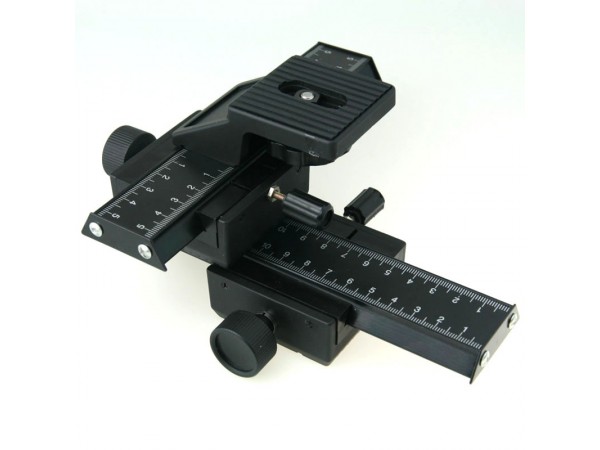
|
|
|
|
Posted by kodomo on
09-14-2015
|
|
fiogf49gjkf0d There has been some changes, so here is an update;
38hz - 160hz - TAD 1601b (2 on each side) - Ported cabinets
160hz - 600hz - Supravox 285-2000 Hornfabrik edition - cf110hz round tractrix horn
600hz - 4800hz - Radian 850pb 2" cd - cf200hz round tractrix horn
4800hz - 12000hz - Radian 475 beryllium pb 1" cd - cf1000hz round JMLC horn
12000 - 45000hz - Fostex t500amkII - bullet tweeter
I have everyhting except the Tad, and I paid them today as I learned they have it in stock. I most probably will have it by the end of next week. I am also building the uppercase back chamber and the main part of the skeleton of the systems stand via cnc.
Hopefully I will be having more free time and will share some photos and measurements with the fellow community so we can have some info on various drivers and horns and how they work together.
|
|
|
|
Posted by Murataltuev on
09-14-2015
|
|
fiogf49gjkf0d  kodomo wrote: kodomo wrote: | |
Kodomo, can you show parameters page of your model ?I think your real curve will be in 300-1200Hz range, not in 120-400. So, this driver/horn is good to replace your MF channel. This is what I plan to try in 200Hz LeCleach.Try to choose Tools/Directivity/Response.../0 and I think that curve is closer to reality.I don't understand what Acoustic Power means and I don't think that it is somehow close to reality.
|
|
|
|
Posted by kodomo on
09-14-2015
|
|
fiogf49gjkf0d
The acoustic power shows the SPL.
Here is the parameters page.
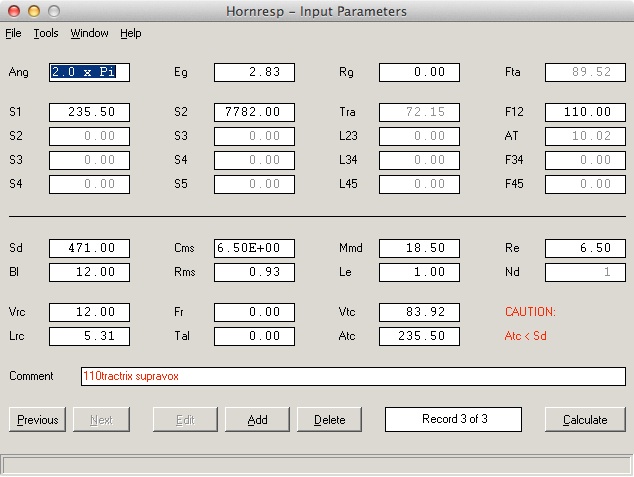
|
|
|
|
Posted by Murataltuev on
09-14-2015
|
|
fiogf49gjkf0d  kodomo wrote: kodomo wrote: |
The acoustic power shows the SPL.
|
|
I don't think so...it is kind of average...Try Acoustic Response at 0 degree! Choose Tools/Directivity/Response/0
|
|
|
|
Posted by kodomo on
09-14-2015
|
|
fiogf49gjkf0d
Here is the response with
Tools/Directivity/Response/0
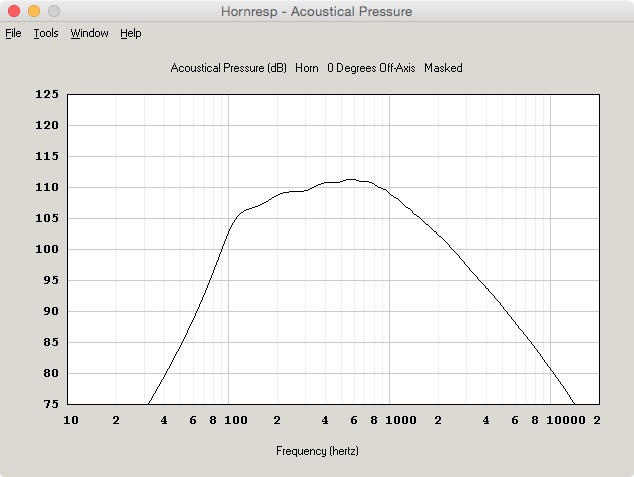
I
don't
think there is a problem.
|
|
|
|
|
|
|
Posted by Romy the Cat on
10-17-2015
|
|
fiogf49gjkf0d Kodomo,
A brief post about concerns. Feel free to discard it.
LF modules – are you sure that you want to go with ported
solution? You can model your boxes and use any good drivers but sonically with
port you will end up with bass that would hardly please you on a long run. In
so many words – it is known that I am only for sealed or infinite baffle but that
is me. Also the location of your bass channels. They need to be outside, not
between your horns. You can very easy to test it yourself. I am sure that you
will say that your room does not support it – well, welcome to the club of very
many people…. Anyhow, do try finding a configuration when bass channels are outside
of your main speakers.
A large glass window behind the horns is a bitch. Deal with
it somehow. Also, on the photograph the horn is sitting very close to the back
wall. I know that it is contra- intuitive but this type of horn topology is super
sensitive to the back walls. Try to move the horns for a good 5-6 foot toward
to the center of the room and you will see how dramatically the sonic presentation
will change. BTW, if you move the horn
for 6 foot forward then you will clear the entrance door and will be able to
move your right channels all the way on the right… gaining more width and
enabling to use bass channel to be outside the horns.
More about the requirement of bass channel to be outside. If
you did not make your boxes for bass then think again. The selection of TAD 1601b is fine but they are 16” that
would require a front baffle to be at least 20”. If you go with smaller driver
then you will be able to make narrower your front baffle. I understand that
larger driver is better but this will be not sub 20Hz woofers but bass module
that do 100Hz and they need to be geometrically at right position. The Supravox drive in the upper bass horn: introduce
another crossover point at let say 60-80hz. There is no reason to have LF signal
to bombard the driver if the horn will not produce it. Your sound from the
upperbass will improve then.
Ok, need to run to deal with baby. Sorry did not say anything
positive, not because your setup does not desire but juts do not have time.
Rgs, Me
|
|
|
|
Posted by kodomo on
10-17-2015
|
|
fiogf49gjkf0d thank you for sharing your concerns.
The LF module I was building was like yours with drivers from scanspeak. However both the dealer was not professional and the the drivers had a certain sound to them (too much character) so I ditched that solution. While I was searching these drivers with a ported cabinet was suggested to me. I hate ported cabinets! I have ported monitor speakers at my studio and I hear the sound of the ports and it irritates me. They are by Adam audio. However this friend suggested I should give it a try. When properly implemented and not forced beyond its capabilities these boxes are supposed to sound good. I will see, if I don't like their sound, Tad drivers are very easy to sell/swap etc.
I will try bass modules in different configurations. I can not widen the space between the speakers though, as my room dictates, yo can see in the drawing from above.
Don't let the perspective fool you, the horns are about 1,2meters (4 foot) away from the back wall.
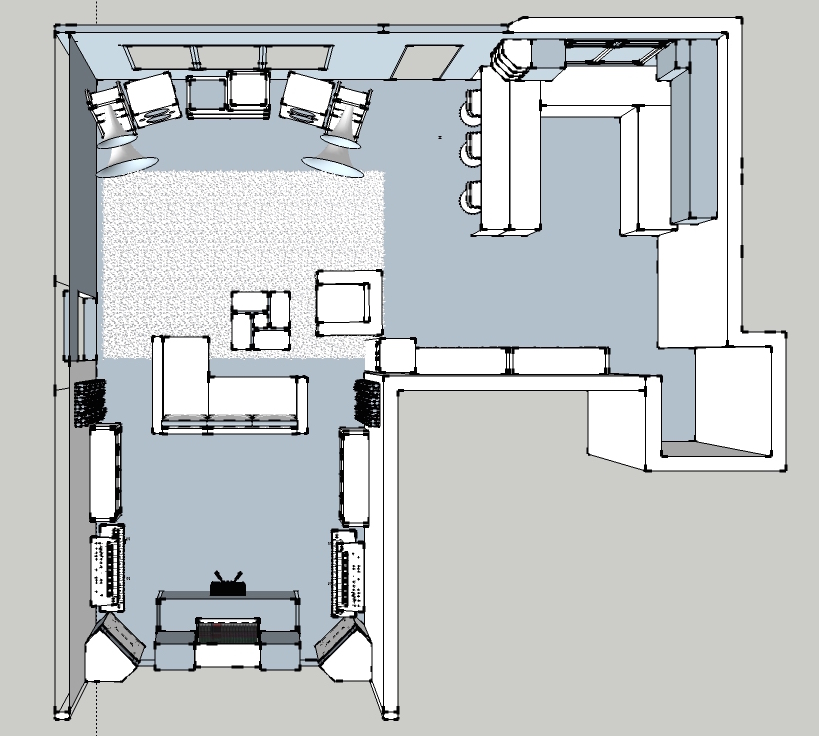
|
|
|
|
Posted by Romy the Cat on
10-17-2015
|
|
fiogf49gjkf0d I see what you mean. I still would go for 10" or
8" drivers. I happened to love the scanspeak (make sure that it was exactly
my model and the box is made probably: large and over-dumped) but if you do not
like them then it is fine and you need
to find your own drivers. Go with smaller drivers and larger amount, the foot
print has been wasted already, so why do not go for 4 or 6 drivers per channel.
Alternately you can just forget about putting
the bass channels outside and keep them inside. It would not be end of the
world, you will pay with less imaging, slightly lower 3D effect and slight diminished
tone. There is another option. If it is your house and if you feel to do it
then you can move the entrance door closer to the window. Then you will be able
to put the right channel at the location where your door now and you will have
the "long wall" effect. That is not too expensive to do and I think
you can do it under $1K.
|
|
|
|
Posted by kodomo on
10-19-2015
|
|
fiogf49gjkf0d The bass enclosure and that door and windows are the things that I haven't decided on yet! I am the owner and the builder of the house and I can do whatever I like with it. Actually that door and windows are not there, it is different now. There is also a wall between my studio and main room but I am demolishing that wall at the moment.
I will be listening to the system and then decide on the size and location of the windows and the door. There is an incredible view there that is part of my listening experience so I will keep the windows. Here is my revised plan that I believe may work better. I am not gonna do more revision drawings as I will decide from here on by listening. If I put the horns like this, I am slightly closer to the wall on the right. This would have an effect on reflections but can be addressed by acoustic solutions (diffusors and absorbers)
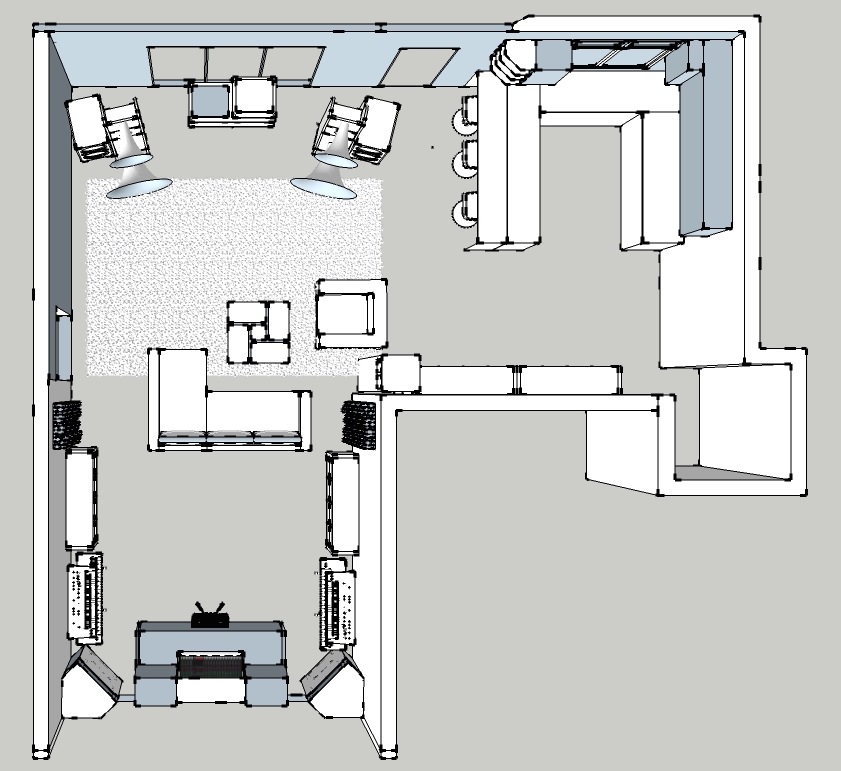
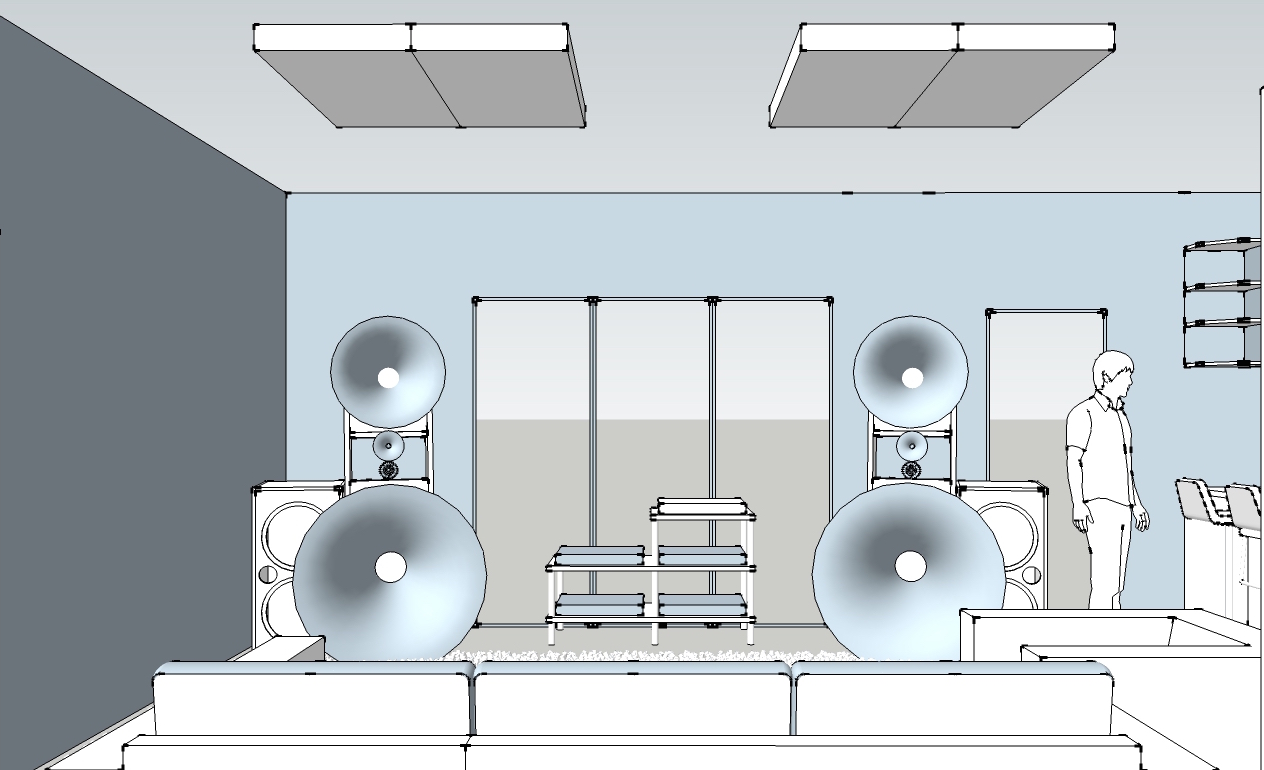
|
|
|
|
Posted by Romy the Cat on
10-19-2015
|
|
fiogf49gjkf0d kodomo, there is a thing that you need to understand. The
objective to have bass channels outside is valid but it is applied to a perfect
condition when you have unlimited width. In the situation like you’re the objective to
have bass channels outside might not be beneficial. You see, by letting the bass
sources to sit outside and gaining on imaging we narrowing the horns closer to
each other and losing in imaging. It is not even the “losing in imaging”. There
is a very intricate dependency between listening distance, max width between
the channels, the room treatment, the room size, the speaker topology, the type
of tweeter mounting, the crossovers, the integration methods and etc…. I can
name another 30 dependencies. The present of bass outside in your situation is
no matter what but it will set the horns out of max width your installation can
handle - In my mind it is always best to have max with possible without distraction
of a center image.
So, what I post my criticism about this or that aspect of somebody
installation them it is not imperative that something in my mind need to be changed
but rather the direction that the system owner might find useful to explore. If
I own your playback and someday told me that bass channels inside is no good
then I would make an experiment with it and then make my own judgment how important
would it be to me and how much I am willing to sacrifice in other aspects of my
life, including the living comfort. So, do your own experiment with bass in and
out, with horns wider and narrowing. Ultimately it is your playback and your decision
what you will be doing. As I told to Murataltuev a few days back – do not harry.
Make an experiment and let it to grow on you. Get use to results and learn to
distinct “better” from “different”.
|
|
|
|
Posted by scooter on
10-19-2015
|
|
fiogf49gjkf0d Kodomo,
Maybe you move low frequencies behind you to back room?
|
|
|
|
Posted by kodomo on
11-11-2015
|
|
fiogf49gjkf0d I have tried a second filter on the Supravox as per your suggestion. Very interesting, it really has audible effect on the sound even if it is small when I put the filter around 40hz. I will try on 60hz and 80hz and keep on listening. It will take time for me to assess this new information as I will need to keep on listening. Just wanted to thank you. I am planning to experiment with the fundamentals channel the same way as well.
Oh and the fundamentals channel although begging me to play a wider range, more or less disappears and actually helps the sound to have more volume (not loudness) when covering a narrower range. It sounds like I will cover just an octave it and its height won't be a problem like I thought it might. I sit about 14 feet away from the mouth of the upperbass horn.I am planning to get a foster r100t attenuator for my fundamental channel. I think it can help me to adjust my system better and can vary in its attenuation depending on my listening distance.
So far I am liking the Radians, but time will tell. First few months impression is it doesn't sound as edgy as my BMS 4592nd-mid 16ohms but seems to have the detail with a more relaxed presentation. Are BMS 4592nd-mids more dynamic or too dynamic I haven't assessed yet.
|
|
|
|
Posted by Romy the Cat on
11-11-2015
|
|
fiogf49gjkf0d  kodomo wrote: kodomo wrote: | Oh and the fundamentals channel although begging me to
play a wider range, more or less disappears and actually helps the sound to
have more volume (not loudness) when covering a narrower range. It sounds like
I will cover just an octave it and its height won't be a problem like I thought
it might. I sit about 14 feet away from the mouth of the upperbass horn.I am
planning to get a foster r100t attenuator for my fundamental channel. I think
it can help me to adjust my system better and can vary in its attenuation
depending on my listening distance.
So far I
am liking the Radians, but time will tell. First few months impression is it
doesn't sound as edgy as my BMS 4592nd-mid 16ohms but seems to have the detail
with a more relaxed presentation. Are BMS 4592nd-mids more dynamic or too
dynamic I haven't assessed yet. |
|
The foster attenuator if
fine for fundamentals. It is very inductive and will eat all your HF but you do
not need them anyhow. The selection of driver for fundamental channel is a bit tricky.
I find that you do not need a good driver but rather a driver that would go a very few thing in a
very specific way. The fundamentals
driver is a viola driver, it do not need to have the violin finger work but in
the same time it should not have a rich viola tone. it is kind of contra intuitive
- you almost want to have a bad driver in there. The problem is that in one octave
in lower MF and relatively sharp filtration the channel will not develop "tone".
So, I would not go for tone but rather for texture. I find that if you get an atrocious
driver and they make it even more evil by idle it load then it might be a good
candidate for fundamentals. Of couse everything in moderation and you need to
make it to work with your MF and upper bass. Still, the fundamental driver is
kind of filling the gap driver and it more gives "sonic fog" then
sound. I would like this "fog" has some tension, some kind of over rosined
bow effect with a lot of "bite". Tone, it is what my MF driver does.
the fundamentals just gives to MF a bit agitation at the bottom of MF.
|
|
|
|
Posted by kodomo on
11-22-2015
|
|
fiogf49gjkf0d While I am waiting for the attenuators I worked on the frame and changed it to a metal frame.
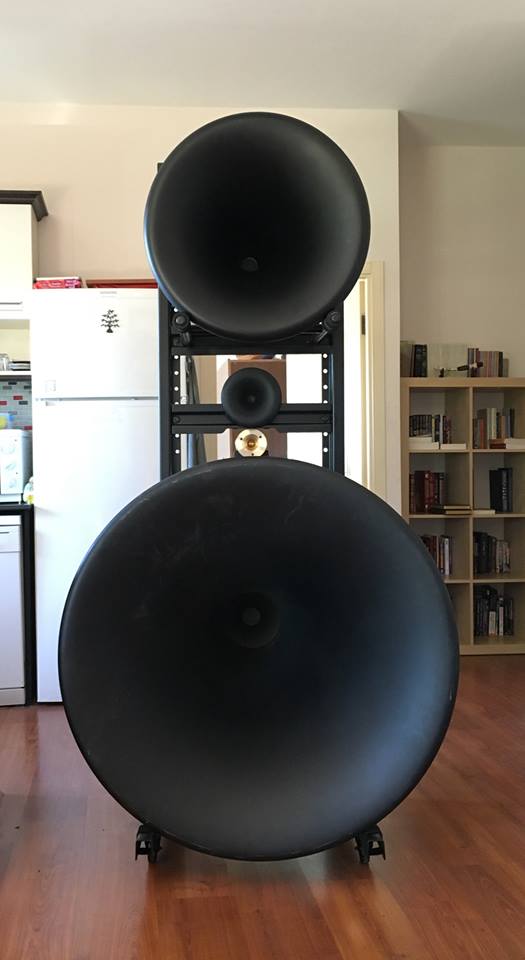
It is sturdy and height of the channels can be adjusted in both axis.
Romy, may I learn what your crossover points for your channels?
My midrange channel is begging me to cover between 640 to 3800 with a 6db crossover 1200 and 2000 respectively. It blends well with the jmlc1000, which covers up to 7400. I was expecting higher, but I just started playing around with it.
So for starters it looks like this now:
160-640 upperbass with supravox 285-2000 hornfabrik edition with 110hz tractrix
640-3800 midrange with Radian 850pb and 200hz tractrix
3800-7400 upper midrange with Radian 475be-pb and 1000hz jmlc
7400-20000 treble with Fostex t500amkII
Upperbass channel easily covers 160-640. I haven't yet finished the direct radiators. Its parts are cut, the drivers are here but I need to get it together and paint.
|
|